- Home
- McBain, Ed
The Big Bad City Page 3
The Big Bad City Read online
Page 3
Sonny was listening hard now.
“Why, he goan kill you, man,” Juju said.
Sonny nodded.
“You want my advice? Do him fore he does you. And do it clean, man, cause you the first one they goan come lookin for. Clean piece, no partners, in, out, been nice to know you.”
Juju looked him dead in the eye.
“And forget we ever had this conversation,” he said.
IHS.
Carella first saw those initials on a statue of Christ hanging from the cross in the church he’d attended as a boy. The initials were lettered onto a banner above Christ’s thorn-crowned head. When he asked his grandmother what they stood for, she said, “I Have Suffered.”
Carella felt fairly certain they didn’t mean “I Have Suffered” because that was an English sentence, and what they spoke in Jerusalem was either Latin or Hebrew. So he’d asked Sister Helen, the nun who was teaching him catechism three afternoons a week in preparation for his first Holy Communion, and she said the letters were a monogram of our Lord’s name and that they stood for Jesus Hominum Salvator, which meant “Jesus, the Savior of Men.” He was only ten years old but he asked her whether Jesus didn’t save women, too, and she said he most certainly did and told him to go sit in the back pew of the church.
Several weeks after that, on a rainy Saturday when only two other kids showed up for catechism, Sister Helen took him aside and told him she was a virgin consecrated to God. And as lightning crashed overhead, illuminating the tall stained-glass windows, she removed a slender gold band from the third finger of her left hand, showed him the letters IHS engraved inside, and reverently whispered that she wore the ring in memory of her betrothal to her heavenly spouse.
Carella hadn’t known what a virgin was.
It wasn’t until he was sixteen or seventeen and knew what virgins were and weren’t that he began wondering again about those initials IHS. This was after he’d already stopped going to church and rarely wondered about holy matters anymore, but he kept seeing the letters over Christ’s head whenever he wandered past any shop selling religious items. He hated mysteries as much back then as he did now, so he went to the library and began digging. He discovered that the nomina sacra —as the various names of Jesus Christ were called—were very often shortened or abbreviated and that one of the monograms was the Greek IHΣ for IHΣOΣ, usually followed by XPΣ for XPIΣTOΣ, which made about as much sense to him as had Sister Helen’s Jesus Hominum Salvator . So he dug a bit further and learned that the Greek spelling IHΣOΣ XPIΣTOΣ translated as Iesous Christos, or Jesus Christ, and IHΣ was IHS, or the Greek abbreviation for Jesus.
Jesus, he had cracked the code!
Now, almost thirty years later, he found the initials IHS engraved on the inside of a gold wedding band worn by a murdered woman, and remembered Sister Helen again and the initials inside her ring, and he knew without question that the woman lying beside that Grover Park bench was a nun.
Carella’s desk copy of the current “Official Catholic Directory of the City’s Archdiocese” listed six hundred and thirty-seven nuns living in thirty-five convents and residences. There were forty-four other convents statewide and Carella chose not to count the number of sisters living in those, thank you very much.
He called the number he had for the archdiocese and spoke to a priest there who listened to his question and said he had no way of knowing whether any of the convents had reported a missing nun. He suggested that Carella try calling each of the convents individually, but …
“I’m sure you know, Detective … or perhaps you don’t.”
“What’s that, Father?”
“Well … in this day and age, not all nuns live in convents. Many of them take up residence close to their work. They’ll either rent an apartment or a small house with another nun or nuns, or else they’ll live alone.”
“Is there another listing?” Carella asked.
“Sorry?”
“Of these other residences.”
“I’m afraid not. Sisters go where they’re needed and where they’re sent. Their mother houses would know where they are at all times, but then again … if you don’t know who the nun is, you won’t know her mother house, either, will you?”
“Do you know which orders still wear wedding bands?” Carella asked.
“Wedding bands?”
“Symbolizing the marriage to …”
“Oh. No. I’m sorry. I don’t.”
Well, Carella could have spent the next week and a half zeroing in on the orders that still wore wedding bands with the initials IHS engraved inside, or he could have spent the next month and a half calling every convent in the directory—none of which had listed phone numbers, he noticed, another plus—but there was an easier way.
A surefire American way.
He went directly to the media.
2
SUPPOSE YOU GET ON A BUS, AND THE DRIVER IS DUSTIN HOFFMAN? I MEAN, THERE’S THIS GUY SITTING BEHIND the wheel, and he looks just like Dustin Hoffman and everything, but you know he isn’t Dustin Hoffman because there aren’t any cameras around, they’re not shooting a movie or anything on the bus. This is just a normal bus and a normal bus driver who happens to look just like Dustin Hoffman. Do you understand me?”
“Uh-huh,” Carella said.
“That’s the way I felt when I saw that police sketch of Mary on the front page of the newspaper. I thought ‘That isn’t Mary, it can’t be Mary.’ Same as I would think ‘That isn’t Dustin Hoffman, it’s just a bus driver.’ Is it Mary?”
“You’ll have to tell us,” Carella said.
“I mean, I just saw her yesterday, and everything.”
They were in the Chevy sedan Carella and Brown drove whenever their preferred car was in for service, as it was today. The girl’s name—they thought of her as a girl because she was still in her early twenties—was Helen Daniels, and she was sitting on the back seat, smoking. She was a nurse, but she was smoking. She had told them on the phone that the woman on the front page of that morning’s tabloid was Sister Mary Vincent. It was now close to noon on a steamy Saturday, the twenty-second day of August, and they were driving her to the morgue.
“When yesterday?” Brown asked.
“At the hospital.”
Which answered where yesterday, but not when.
They waited.
“We worked the same shift. Seven in the morning to three in the afternoon.”
“Was she a nurse?”
“An LPN. St. Margaret’s is one of the hospitals run by her order. She worked with the terminally ill. Cancer patients mostly.”
“What’s an LPN?” Brown asked.
“A licensed practical nurse. But she was better than any RN I know, believe me.”
“Was that the last time you saw her? Yesterday at three? When the shift …”
“Yes. Well, not three. We went for coffee together after the shift broke.”
“Then what?”
“I went to the subway.”
“Where’d she go?”
“I don’t know.”
“Didn’t say where she was going?”
“I guessed she was going home. It was already four, four-thirty.”
“How long have you known her?” Carella asked.
“Be six months in September. That’s when she started working at St. Margaret’s.”
“How’d she get along there?”
“Fine.”
“Good worker?”
“Oh, yes.”
“Got along with the other nuns?”
“Yes.”
“Nurses?”
“Yes, of course.”
“Doctors?”
“Yes.”
“While you were having coffee …,” Brown said. “Where was this, by the way?”
“Deli across the street from the hospital.”
“See anybody watching her?”
“Paying unusual attention to her?”
“No, I can’t th
ink of anyone.”
“Anyone follow you out of the deli?”
“I don’t think so.”
“When you left each other, was she walking, or did she catch a cab, or what?”
“She was walking.”
“In which direction?”
“She turned the corner and headed crosstown.”
“Toward the park?”
“Yes. Toward the park.”
Helen Daniels was a nurse, and so she did not display any squeamishness at being inside a morgue. This was not the hospital for which she worked, but it was nonetheless familiar territory. She followed the detectives into the stainless-steel chamber with its stainless-steel dissecting tables and stainless-steel drawers, and watched while the attendant on duty rolled out the drawer with the unidentified corpse on it, and she looked down at the face and said, “Yes, that’s Mary Vincent,” and went outside to vomit.
First thing you had to understand about this city was that it was big. It was difficult to explain to someone who came from Overall Patches, Indiana, that you could take his entire town and tuck it into one tiny corner of the smallest of the city’s five separate sectors and still have room left over for the entire bustling municipalities of Two Trees, Wyoming, and Sleepy Sheep, South Dakota.
This city was dangerous, too. That was the next thing you had to know about it. Never mind the reassuring bulletins from the Mayor’s office. Ask the Mayor to take an unescorted two A.M. stroll through any of the city’s barren moonscapes and then interview him in his hospital bed the next morning to ask him about lower crime rates and improved police patrols. Or just watch the first ten minutes of the eleven o’clock news every night and you’ll learn in the wink of an eye exactly what the people of this city were capable of doing to other people in this city. It was on last night’s eleven o’clock news that the story of the unidentified dead nun had first been broadcast to a populace accustomed to news of dead people turning up in Dumpsters or abandoned bathtubs. Bad things happened in this city every hour of the day or night, and they happened all over the city.
So if you came here thinking, Gee, there’s going to be a neat little murder takes place in a town house and some blue-haired lady will solve it in her spare time when she isn’t tending her rose garden, then you came to the wrong city at the wrong time of the year. In this city, you had to pay attention. In this city, things were happening all the time, all over the place, and you didn’t have to be a detective to smell evil in the wind.
She had come home from work yesterday evening to find that her apartment had been “robbed,” as she’d put it when she phoned the police. The two responding uniformed cops informed her that the correct expression was “burglarized,” as if that made a damn bit of difference, and then asked her a lot of dumb questions about “access” and “vulnerability,” which she supposed meant Who has a key to the front door and Which window opens onto a fire escape? And now—only a day late and a dollar short—here were two plain-clothes detectives asking the same dumb questions. Her best friend, Sylvia, whose apartment had been broken into last year around this time, told her that there wasn’t a single recorded instance in this city of the cops ever catching who did it or ever recovering the stolen goods, it was all a waste of time and taxpayers’ money. But here they were at twenty minutes to one on the day after the burglary, when she had a hundred Saturday afternoon errands to run.
“We’re sorry to bother you,” the bald one was saying. She was sure he’d introduced himself as Meyer Meyer, but that couldn’t be a person’s name, could it? He was a tall, burly man wearing pale blue trousers and a lightweight sports jacket, the collar of his shirt open and worn outside the jacket collar, the way teenagers in America used to wear it in the forties and the way Russian gangsters wore it today, from pictures she had seen in Life magazine.
“What time did you get home from work last night?” the blond one asked. He was very good-looking, if you cared for apple pie and chocolate milk midwestern shit-kicking looks, an inch or so taller than his partner, just as wide in the shoulders, both of them in their mid-to late thirties, she supposed, which made them both too young for her, not that she was interested. Annie Kearnes was forty-two years old, almost to the day, since her birthday had been last Tuesday, August eighteenth, a Leo as she was proud of telling first dates. Annie went on a lot of first dates. She wondered if either of these two boring gentlemen was married, though police work seemed an extraordinarily dangerous occupation.
“I get home most nights a little before six,” she said.
“And last night?”
“The same.”
Did they think she was telling them she got home most nights a little before six because last night she’d got home at seven? What kind of mentality was that? Or was this just cops zeroing in on the facts, ma’am, as if she herself was the one who’d robbed her own apartment, burglarized it, whatever the hell. Where she worked was R&R Ribbons, which manufactured the shiny little red and blue and green and gold bows you peeled the backs off and stuck to all sorts of presents. August was the busiest time of the year for R&R, which stood for Rosen and Riley. August was when all the Christmas orders came in. October was when they shipped. What she really needed was a friggin robber breaking into her apartment yesterday.
“How’d the place look?” Meyer asked.
“Excuse me, but did you say Meyer Meyer?” Annie asked.
“Yes, ma’am, that’s correct,” Meyer said.
“That’s unusual,” she said.
“Yes, it is,” he agreed.
Nice gentle manner, like a dentist who treated mostly kids. She wondered again if he was married. Too bad he wasn’t a dentist. Bring a cop home to her mother, oh boy, what a scene that would be. The blond one was looking at a framed picture on the wall, which showed Mr. Rosen and his wife in her mink coat sticking a giant bow onto a giant package outside the city’s biggest department store seven Christmases ago, while it was snowing very hard. It hadn’t snowed at all this past Christmas. Nor even this entire winter, for that matter. People had been grateful it was such a mild winter. Boy, are we lucky, people were saying all over the place. Now it was so hot you could melt in your panties and everybody was in the streets on their hands and knees, praying for a stray breeze, it just goes to show, she thought.
“That’s Mr. Rosen,” she said to him, by way of flirtation. “He’s one of my bosses.”
“Nice,” he said.
Typical big dumb cop remark.
Nice.
Bert Kling his name was. A name to match his obvious intelligence.
“So how’d the apartment look when you walked in?” Meyer asked.
“Same as always,” she said.
If you’re so curious about how the apartment looked, she thought, why didn’t you come around last night, so you could see it right after it was robbed? No wonder you never catch anybody, she thought.
“Was there a mess or anything?” Kling asked.
“No. Neat as a pin,” Annie said.
“When did you realize someone had been in here?”
“When I found the bag of cookies.”
“On the bed?” Meyer asked.
Mind reader, she thought. Or had the two Keystone Kops from yesterday submitted a report on what she’d told them?
“On the pillow, yes. Chocolate chip cookies.”
The cookies still infuriated her. The goddamn nerve! Guy breaks in, steals all her jewelry and a red-fox jacket that had cost her two thousand dollars wholesale and then he had the audacity to leave a box of chocolate chip cookies on her pillow? Like spitting in her eye, wasn’t it? Did he expect her to eat the damn cookies? Who knew what was in those cookies, what kind of poison he’d put inside them, the friggin lunatic?
“We just want to make sure it’s the same person,” Meyer said. “He’s been getting some play in the papers and on TV, he might be inspiring copycats.”
“Did they give you the list?” Annie asked.
“The off
icers who responded? Yes, they did. Thank you. We’re working on it now.”
“They’re calling him The Cookie Boy,” Kling said.
“Cute,” she said, and pulled a face. “You ever catch him, I’ll give him cookies.” She hesitated for just an instant, and then she said, “Will you catch him?”
“We’ll try,” Meyer said.
“Yes, but will you?”
“We’ll be circulating the list to pawnshops all over the city, maybe we’ll get a call, who knows?” Kling asked the air.
“Also,” Meyer said, “we make a lot of unrelated arrests every day of the week. Someone we pull in may drop something about him, who knows?”
“What do you mean?”
“Thieves talk to each other, they learn things they sometimes use to bargain with us.”
“Like what?”
“Like this guy leaves cookies on the pillow, he mentioned he was in an apartment on South Twentieth two days ago, like that,” Kling said.
“You actually had someone tell you this?”
“No, I’m just giving you an example.”
“So what you’re saying is it’s all a matter of luck, is what you’re saying.”
“No, not at all,” Kling said.
“Not at all,” Meyer said.
“Must be an echo in here,” Annie said. “Then what is it, if not luck? You send a list to pawnshops, you hope some pawnbroker’ll spot my sapphire ring and give you a call. Or you arrest some rapist or whatever, some bank robber, and you hope he’ll turn in his best friend, who happens to be The Cookie Burglar …”
“The Cookie Boy.”
“Cute,” she said again, and again pulled a face. “What’s that if it isn’t luck?”
“Well, there is a certain amount of luck involved,” Meyer agreed. The good dentist.
“But we’ll be doing a lot of investigative work as well,” Kling said.
“Like what?”
“Well, it would take all day to explain.”
I’ll bet, she thought.
“What it looks like to me,” she said, “is I can kiss my stuff goodbye, right?”

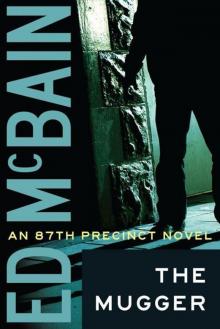 87th Precinct 02 - The Mugger
87th Precinct 02 - The Mugger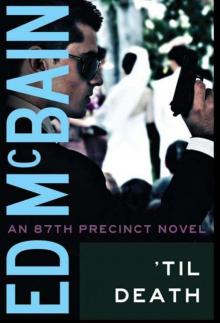 87th Precinct 09 - Til Death
87th Precinct 09 - Til Death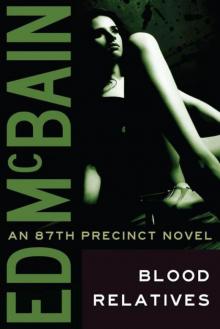 Blood Relatives (87th Precinct)
Blood Relatives (87th Precinct) Killer's Payoff
Killer's Payoff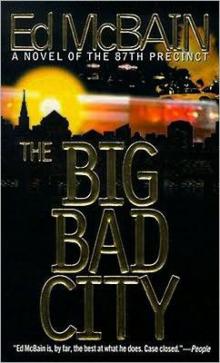 The Big Bad City
The Big Bad City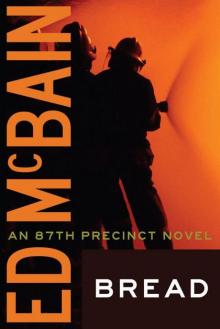 Bread (87th Precinct)
Bread (87th Precinct)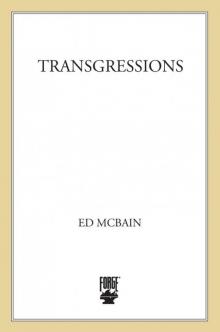 Transgressions Vol. 3
Transgressions Vol. 3 Runaway
Runaway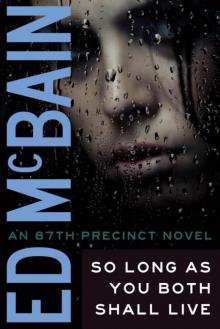 So Long As You Both Shall Live (87th Precinct)
So Long As You Both Shall Live (87th Precinct)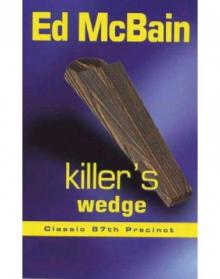 Killer's Wedge
Killer's Wedge